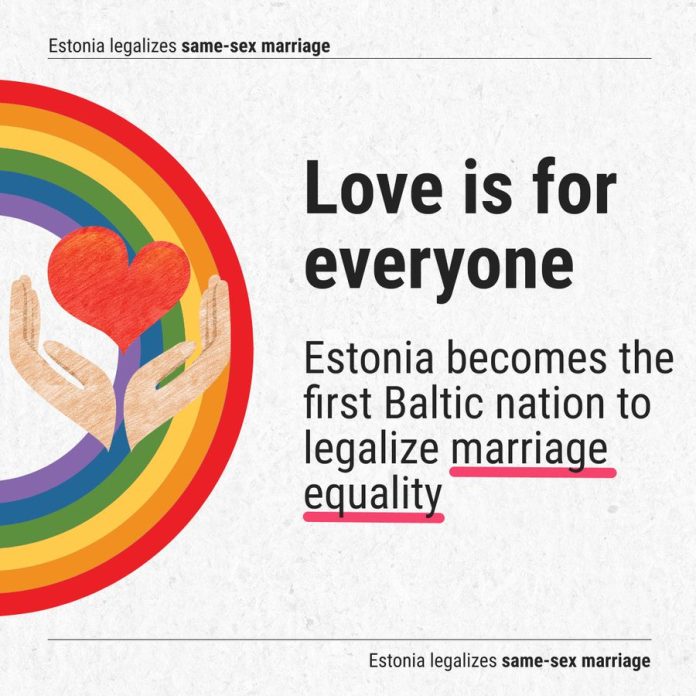Estonia has legalised same-sex marriage, the first central European country to do so. The 101-seat parliament voted 55 in favour of the new law, a singular move by the ruling coalition of liberal and social democratic parties assembled by Prime Minister Kata Kallas (Reform Party) after her election victory earlier this year.
In remarks directed to other central European countries, Kallas, acknowledged the difficulties involved but insisted that “marriage and love is something that you have to promote.” Estonia had developed a lot since freeing itself from “the (Soviet) occupation” of 30 years ago, she said. “We are equals among same-value countries.”
Unlike much of the West, same-sex marriage has remained illegal in previously Soviet-dominated central European countries that since become members of NATO and/or the EU.
After the historic vote, Kallas tweeted: “It’s official – Estonia has legalised marriage equality. We join other Nordic nations with this historic decision. I’m proud of my country. We’re building a society where everyone’s rights are respected and people can love freely. The decision will enter into force from 2024. ”
A poll by the Centre for Human Rights this year had showed 53% of the Baltic country’s 1.3 million population favouring same-sex marriage compared to a 34% approval rating a decade ago. Some 38% of Estonians still find homosexuality to be unacceptable, however. Among ethnic-Russians, who account for a quarter of the population, only 40% support same-sex marriage.
In neighbouring Latvia and Lithuania, both of which, like Estonia, had previously been annexed by the Soviet Union, same-sex partnership bills remain stuck in their respective parliaments.
The 55-to-34 outcome in the Riigikogu, Estonia’s parliament, enabled the government to survive a vote of no confidence that hinged on amendments to the Family Law Act and related legislation granting same-sex couples the right to legally wed. The amendments proposed that the legal definition of the institution of marriage be modified so that any two natural persons of legal age, regardless of gender, may marry — the words “man and woman” to be replaced with the words “two natural persons”.
Amendments to the Family Law Act and other legislation including provision for implementing the Registered Partnership Act had remained more or less shelved since the enabling legislation was initially passed in 2014. Fully implemented, people would continue to have the right to enter into a registered partnership that would guarantee the right of registered spouses to have a say in decisions pertaining to their partner and to obtain relevant support and benefits. Such couples would also be able to convert their status to one of marriage should they so wish. The proposal also clarifies the Family Law Act as it applies to the regulation of parenthood with regard to same-sex couples, including adoption rights. These rights and obligations do not extend to couples in de facto relationships.
With Tuesday’s decision, Estonia joins Slovenia as the second country in Eastern Europe to accept same-sex marriage.
Minister of Social Protection Signe Riisalo (Reform) said that marriage equality will make Estonia a more inclusive and considerate place. “Guaranteeing equal rights for all is such an elementary thing that this issue was essentially covered in the discussions that took place in the years immediately after we regained our independence. I am delighted that the decision has now been taken for a more forward-looking Estonia that cares for all.”
The far-right Conservative People’s Party of Estonia (EKRE) voted against.

